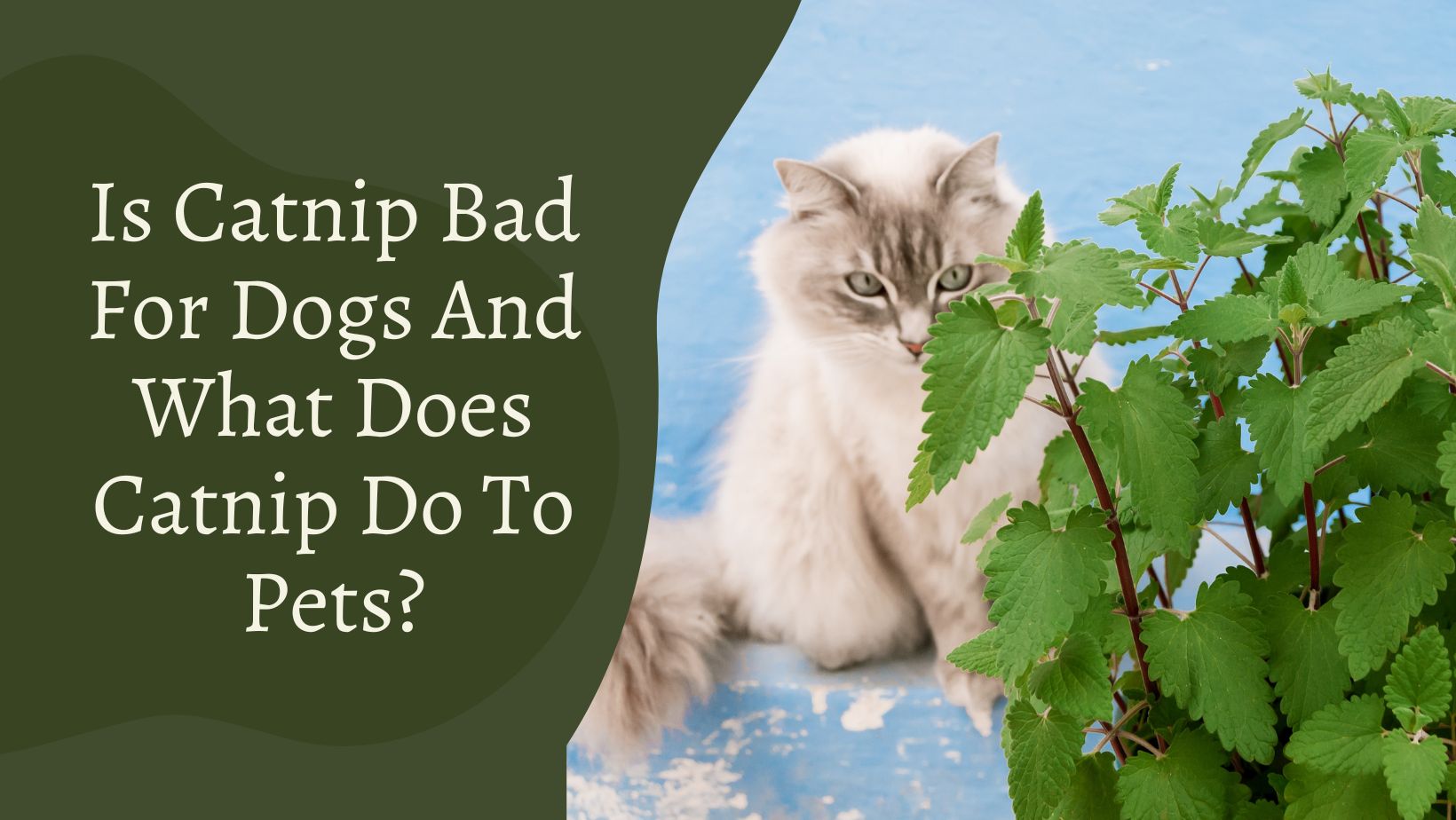
Is catnip bad for dogs? is common question of all dog peoples because allowing dogs to sniff catnip plants is fine as long as you don’t expect them to fall into raptures. While your dogs will not react to catnip in the same way that cats do, the herb has provide benefits for them as well. Catnip is a mint-family herbaceous plant that can make you sleepy. Your dogs will get a bit tired after sniffing the leaves.
Catnip, on the other hand, is commonly used as a gentle natural sedative in dogs. This makes it an excellent tool for calming your dog during thunderstorms, fireworks, veterinarian appointments, and other stressful circumstances.
It could also help them sleep or get rid of a stomach ache. The Dog People, you may add up to half a teaspoon of dry catnip to your dog’s food or put a few catnip leaves in their water dish. Though the herb is safe for canine ingestion, it’s always a good idea to consult with your veterinarian before giving it to your dog.
Catnip is a plant that belongs to the same mint family as mint. Nepetalactone is the active chemical ingredient in catnip. The component may be found in the pods, leaves, and even the stem of the plant.
This is the active substance that will drive your cat insane! Catnip may make cats feel mellow, give them a high, or even make them act a little overexcited. It’s also widely used as a foundation for tea that may be consumed. While some individuals find catnip tea relaxing, it does not have the same mood-lifting properties in humans as it does in cats.
It is not only safe for dogs, but it is also nutritional! Catnip is high in a number of key nutrients, including:
- Vitamin C is a powerful antioxidant.
- Vitamin E is a powerful antioxidant.
- Magnesium
- Tannins
- Flavonoids
- Essential oils are a type of oil that is used
Catnip, in addition to being high in critical nutrients, may also help your dog relax. Its has long been recognized as a safe and healthful herbal cure for a variety of canine problems.
Catnip is a natural plant made up of leaves and stems that will not harm your dog and can be beneficial in some instances.
For example, if your dog is afraid of vehicle journeys, sprinkle some catnip on their food or in their water. This will help them relax, making the travel a lot less stressful for both of you! It’s recommended to consult your veterinarian about how much catnip to give your pets.

Can dogs have catnip:
Catnip is acceptable for dogs. If you’re worried about your dogs eating catnip from your garden or taking it from your cats, you don’t have to be concerned.
Your dogs will not be harmed by catnip, and it really provides a number of health benefits for them. If you want to offer your dogs catnip on a regular basis, you may cultivate it yourself at home or in your garden to guarantee that you always have a supply.
Does catnip effects dogs:
Catnip may be used to make your dog feel more at peace when they are left home alone, when they go to the vet, or when they are outside during a storm. The soothing effect of catnip on dogs is the polar opposite of catnip’s impact on cats.
It’s a simple and effective technique to relax your dog by sprinkling around 14 tsp on their meal. When it comes to stomach issues, catnip is also effective. It can be used to alleviate gas and to relax the digestive system’s muscles, preventing waste from being passed too fast.
There are also different ways that catnip can influence and aid dogs:
Natural sedative:
Natural sedative are the one that can aid dogs that have difficulties sleeping. To help them sleep better, add up to half a teaspoon of catnip to their diet or a tiny bit of catnip tea to their drinking water.
Diuretic:
Catnip is a diuretic that may be used by both people and dogs. The oil in catnip aids in the elimination of excess water and harmful pollutants (uric acid, waste from colds, and so forth) from their systems.
Intestinal Health:
Catnip can aid with a variety of gastrointestinal problems, such as gas and flatulence. Cramping, diarrhea, and dyspepsia can all be relieved with catnip. Fresh catnip, catnip oil, or catnip tea can help ease an upset stomach in your dog.
Menstruation:
Dogs do menstruate, and they can have cramps that are comparable to those experienced by human women. Catnip is commonly used by women to help with menstrual cramps, and it may also be given to dogs for the same purpose.
Natural Antiseptic:

Thymol, found in catnip, has antiseptic effects. It may be used to cure wounds and scrapes, as well as to speed up the healing of sores.
Insect Repellent:
Catnip is effective in repelling mosquitoes, fleas, and other insects. Catnip may also keep fleas and mosquitos away from your dogs and cats, ensuring that they are happy and healthy.
Try catnip if you notice them clawing and chewing at themselves. Catnip is not only healthy for your dog, but it is also quite helpful in treating a wide range of health problems. Consider putting it to good use for the health of your dog!
Does catnip work on dogs:
Yes, this tonic herb provides several health advantages for your pet; some of the most prevalent are listed here. The plant’s green leaf includes critical nutrients and antimicrobial components including vitamins C and E, magnesium tannins, and flavonoids, all of which benefit your puppy’s health.
The oil of catnip is beneficial to a dog’s digestive system and helps to maintain it healthy. It also promotes urinary tract and kidney health and helps to rid the body of excess water and toxins like uric acid by encouraging urination.
This plant’s oil is also effective as a mosquito and bug repellent for dogs. Flatulence, gas, cramps, spasms, diarrhea, and dyspepsia are all relieved by this supplement. Assist your dog with his or her erratic sleeping habits and enhance his or her sleeping pattern.
It’s used as a sedative and a nerve tonic. Works wonders for anxious dogs, reducing stress, excitement, and even scared behaviors. Because of its antibacterial qualities, it may be used as a natural antiseptic to treat wounds, scrapes, and cuts. Regulate your puppy’s blood flow. Fleas and thick on dogs may be gotten rid of with a spray of catnip oil.
What does catnip do to dogs:
Despite the fact that catnip is known to have significant stimulating effects on cats, it has not been shown to be poisonous to dogs. It’s pretty unusual to see cats go insane when catnip is applied to or around them. Catnip has a different effect on dogs than it does on cats.
In cats, it functions as a stimulant, whereas in dogs, it acts as a sedative. As a result, pet experts suggest giving catnip to dogs only if particular conditions or circumstances need it.
Sedative
Catnips, although being a stimulant for cats, have a sedative effect on dogs. Catnip might help your dog relax when it is worried or restless. Fresh catnip leaves may be added to its drinking water, and dried catnip leaves can be added to its meals.
Diuretic
When taken by humans, catnips have diuretic properties. It operates in the same way in dogs. Catnip, when given to water or food, may encourage urine, keeping your dog’s system clean and light. But be careful not to overdo it.
Healing Wounds
Because of its thymol content, catnip can be utilized for wound healing. Thymol is an antibacterial chemical that is beneficial in the treatment of external wounds. For faster and better wound healing, use fresh catnip juice or catnip oil to canine wounds, sores, and scratches. Catnip may also be used to deter insects from biting dogs when they are outside.
Problems with the Gastrointestinal System
Our dogs, like us, can have intestinal and stomach problems, and catnip is thought to help alleviate these problems. Gas/flatulence, cramps, diarrhea, and dyspepsia are some of the symptoms. To settle a canine’s stomach and avoid vomiting, fresh catnip or catnip oil can be put to water.
Mineral-rich soil
Vitamin C, E, magnesium, flavonoids, and tannins are all found in catnips, making them a healthy snack. It also contains oils that aid in the proper functioning of your dog’s digestive tract.
Anxiety and Sleep
Because catnip has soothing properties, it may help with sleep and anxiety. If your dog is suffering from sleeplessness, catnip may be able to help.
Can human eats catnip:
Modern medical science hasn’t done much research on catnip’s effects on people, but both European and American folk traditions attribute this plant with a variety of medicinal abilities. A sedative effect is thought to be one of catnip’s principal effects on people.
A little dosage of catnip brewed in a tea or taken as a food supplement, according to traditional folk medicine, can help with sleeplessness. The plant has also been used for centuries to treat colds, flu, asthma, bronchitis, and other respiratory illnesses, as well as stomachaches and other digestive issues.
Both contemporary physicians and traditional healers advise against giving this plant to pregnant women since it may cause the fetus to die. Catnip may have analgesic properties in humans.
Many people feel that chewing the plant might help with toothache relief. It’s been used to treat headaches as well. Catnip can also be used topically to help stop bleeding and speed wound healing.
The leaves and blossoms of the plant are used in most therapeutic formulations, however some herbalists feel that the roots of the plant might induce irritation.
Can dog get high off catnip:
Cats react to catnip in a variety of ways, and it’s not uncommon to watch them go crazy when given a smidgeon. Catnip, on the other hand, has the exact opposite effect on dogs as it does on cats. While it is an excellent stimulant for cats, it is really a sedative in dogs.
Your dog’s tummy may be upset if he eats a huge quantity (like the entire bottle!). Only give them a modest quantity, perhaps 1/4 to 1/2 teaspoon. The worst that can happen if you use it too much is that it loses its potency or that your pet becomes a little too hyper or calm.
Does catnip work on dogs:
The answer is most likely no. But the key word here is ‘probably,’ since the fact is that we just don’t know whether cats are affected by catnip. And, if they are, whether all canines are affected or just a few, and what the ramifications are.
A cursory review of the literature reveals that the impact of catnip on dogs has never been investigated, but many herbalists believe that even while dogs don’t react to catnip in the same manner as cats do, it may still have an effect.
Conclusion:
The basic answer is that your pet will not be harmed by sniffing, rolling, licking, or eating the plant. Catnip can also be used as a home cure for your dog’s health. If you give your dog catnip before a doctor visit, for example, it can be a safe and gentle method to soothe Fido. Car sickness and stomach disturbances can also be helped with this plant. Finally, if you extract the essential oil from the plant and apply it to your dog’s skin, he will get the benefits of catnip.
Catnip oil repels mosquitoes ten times more effectively than the chemical used in most commercial insect repellents, and it also repels fleas. We looked at some of the effects of catnip on dogs in this post. he sedative effects of catnip are at the top of the list of its various affects on dogs. While not all dogs will react to catnips in the same manner, the majority of dogs will. We also talked about anise, which is catnip’s canine counterpart. It has stimulating characteristics, similar to catnips, in addition to its numerous health advantages. If you haven’t already, you should give it a go and see how your dog reacts. We also spoke about anise alternatives for dogs to give you another choice if anise isn’t available.

Hi This is Maria, We are a team of gardening enthusiasts with a passion for gardening. We have tried to bring you tips and advice enabling you to grow and maintain a healthy and beautiful garden. We Hope You Find it Useful.







